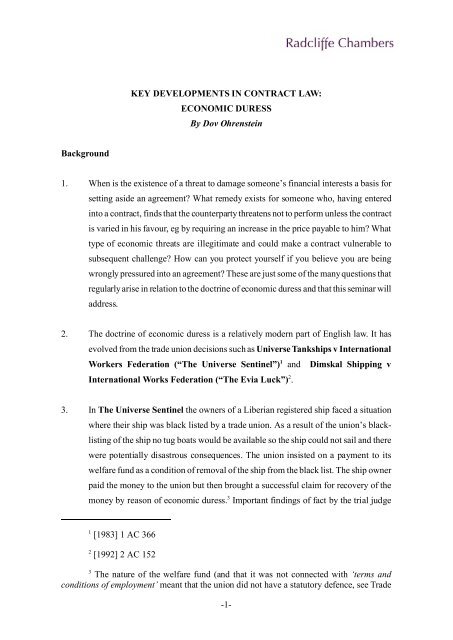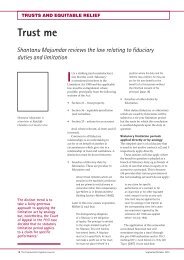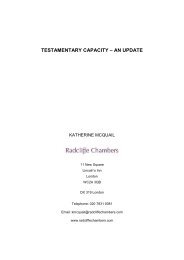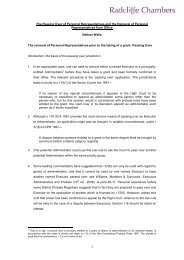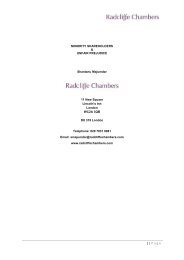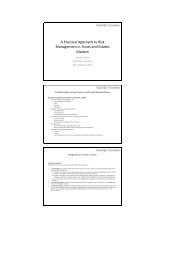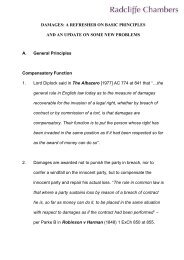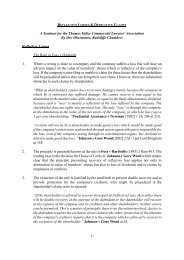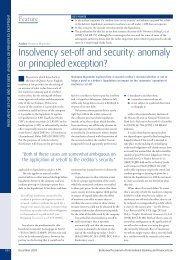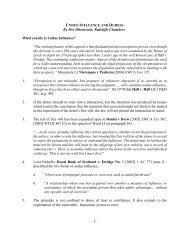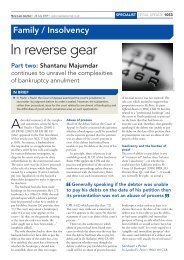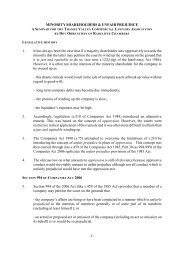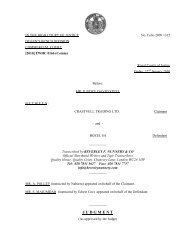Economic Duress - Radcliffe Chambers
Economic Duress - Radcliffe Chambers
Economic Duress - Radcliffe Chambers
You also want an ePaper? Increase the reach of your titles
YUMPU automatically turns print PDFs into web optimized ePapers that Google loves.
KEY DEVELOPMENTS IN CONTRACT LAW:<br />
ECONOMIC DURESS<br />
By Dov Ohrenstein<br />
Background<br />
1. When is the existence of a threat to damage someone’s financial interests a basis for<br />
setting aside an agreement? What remedy exists for someone who, having entered<br />
into a contract, finds that the counterparty threatens not to perform unless the contract<br />
is varied in his favour, eg by requiring an increase in the price payable to him? What<br />
type of economic threats are illegitimate and could make a contract vulnerable to<br />
subsequent challenge? How can you protect yourself if you believe you are being<br />
wrongly pressured into an agreement? These are just some of the many questions that<br />
regularly arise in relation to the doctrine of economic duress and that this seminar will<br />
address.<br />
2. The doctrine of economic duress is a relatively modern part of English law. It has<br />
evolved from the trade union decisions such as Universe Tankships v International<br />
Workers Federation (“The Universe Sentinel”) 1 and Dimskal Shipping v<br />
International Works Federation (“The Evia Luck”) 2 .<br />
3. In The Universe Sentinel the owners of a Liberian registered ship faced a situation<br />
where their ship was black listed by a trade union. As a result of the union’s blacklisting<br />
of the ship no tug boats would be available so the ship could not sail and there<br />
were potentially disastrous consequences. The union insisted on a payment to its<br />
welfare fund as a condition of removal of the ship from the black list. The ship owner<br />
paid the money to the union but then brought a successful claim for recovery of the<br />
money by reason of economic duress. 3 Important findings of fact by the trial judge<br />
1<br />
[1983] 1 AC 366<br />
2<br />
[1992] 2 AC 152<br />
3<br />
The nature of the welfare fund (and that it was not connected with ‘terms and<br />
conditions of employment’ meant that the union did not have a statutory defence, see Trade<br />
-1-
included:<br />
“It was a matter of the most urgent commercial necessity that the plaintiffs should<br />
regain the use of their vessel. They were advised that their prospects of obtaining an<br />
injunction were minimal, the vessel would not have been released unless the payment<br />
was made, and they sought recovery of the money with sufficient speed once the<br />
duress had terminated.”<br />
4. A similar situation arose in The Evia Luck where a ship owner was faced with a<br />
threat that the ship would be black-listed unless various union demands, including a<br />
payment to the union, were met. Initially the demands were not met and the ship was<br />
black- listed but then the plaintiffs signed the various contractual documents which<br />
the union insisted upon so that the ship could sale. The ship owner applied<br />
successfully on the grounds of duress for declarations that it had lawfully avoided the<br />
various agreements it had entered into.<br />
The ingredients of an economic duress claim<br />
5. The necessary ingredients for a successful economic duress claim are:<br />
(a)<br />
Pressure which is illegitimate;<br />
(b)<br />
that the pressure is a significant cause inducing the Claimant to enter into the contract;<br />
(c)<br />
that the practical effect of the pressure is that there is compulsion on, or a lack of<br />
practical choice for, the victim.<br />
6. If the above ingredients are established then the victim of the duress is entitled to<br />
avoid the resulting contract and claim restitution of any monies paid under it. Such<br />
entitlement will be lost if the victim either expressly or by its conduct affirms the<br />
contract.<br />
Union and Labour Relations Act 1984.<br />
-2-
What amounts to illegitimate pressure?<br />
7. In determining whether there has been illegitimate pressure the court takes into<br />
account a range of factors.<br />
“Illegitimate pressure must be distinguished from the rough and tumble of the<br />
pressures of normal commercial bargaining.” See DSND Subsea Ltd v Petroleum<br />
Geo Services ASA 4 .<br />
The relevant factors include:<br />
(a)<br />
Whether there has been an actual or threatened breach of contract;<br />
(b)<br />
whether the person allegedly exerting the pressure has acted in good or bad faith;<br />
(c)<br />
whether the victim had any realistic practical alternative but to submit to the pressure;<br />
(d)<br />
whether the victim protested at the time; and<br />
(e)<br />
whether he affirmed and sought to rely on the contract.<br />
When does a threat to break a contract constitute <strong>Economic</strong> <strong>Duress</strong>?<br />
8. A threat to break a contract is one of the forms of economic duress that has had most<br />
success in reported cases.<br />
9. In The Siboen and The Sibotre 5 there was a threat by charterers of two ships to<br />
break their charterparties by not paying the agreed charter rate unless that rate was<br />
lowered. The owners were informed that the charterers had no substantial assets and<br />
that the parent company of the charterers would allow it to go into liquidation unless<br />
4<br />
[2000] EWHC 185<br />
5<br />
[1976] 1 Lloyds Rep 293<br />
-3-
the hire rates were reduced. That information was untrue but nevertheless caused the<br />
owners to agree a reduction in the charter rate. The Court found for the owners on the<br />
basis of misrepresentation but accepted the principle that economic duress could<br />
apply.<br />
10. <strong>Economic</strong> duress was established in North Ocean Shipping Co v Hyundai (The<br />
Atlantic Baron) 6 where the builders of a tanker who were being paid in dollars<br />
insisted on an additional 10% payment to compensate them for the devaluation of the<br />
dollar. The owners, who at that time were negotiating a very lucrative contract for the<br />
charter of the tanker, replied to the ship builders that although they were under no<br />
obligation to make additional payments, they would do so "without prejudice" to their<br />
rights. Payments of various instalments were made at the increased rate and without<br />
protest. The Court held that the ship builder’s threat to break the contract without any<br />
legal justification unless the owners increased their payments by 10% did amount to<br />
duress in the form of economic pressure and, accordingly, the agreement was a<br />
voidable contract which the owners could have either affirmed or avoided; that, since<br />
there was no likelihood that the company would resile from the contract to build the<br />
tanker at the time she was due for delivery, the owners, by making the final payments<br />
without protest and also by their delay from before making a claim for the return of<br />
the extra payments, had so conducted themselves as to affirm the contract and,<br />
accordingly, their claim failed. It is apparent from this case that economic duress can<br />
arise even when the perpetrator of the duress knows nothing about the victim’s<br />
susceptibility to being pressed.<br />
11. The mere fact that a party has agreed a contractual variation after the other side has<br />
threatened to break the contract does not necessarily mean that the doctrine of<br />
economic duress will apply, but there have been several threatened breach of contract<br />
cases where a plea of economic duress has succeeded. For example:<br />
(a)<br />
In B&S Contracts and Design Ltd v Victor Green Publications 7 where a firm<br />
6<br />
[1979]QB 705<br />
7<br />
[1984] ICR 419<br />
-4-
(which was facing a threat of a strike) impliedly threatened not to perform its<br />
contractual obligation to erect exhibition stands unless it received an additional<br />
payment of £4,500.<br />
(b)<br />
In Atlas Express v Kafko 8 and The Alev 9 where carriers of goods refused to<br />
transport goods unless additional payment was made.<br />
(c)<br />
In Carillon Construction Ltd v Felix 10 where a subcontractor threatened not to<br />
supply goods in accordance with the terms of his sub contract unless the head<br />
contractor agreed a final account sum which was £500,000 more than the head<br />
contractor thought was a reasonable compromise. Here the head contractor felt<br />
compelled to accept the figure so that it ensured delivery of the cladding units. The<br />
threat was also considered to be illegitimate pressure because: (i) withholding<br />
deliveries was a clear breach of contract; (ii) there was no entitlement under the<br />
contract to agree the final account before the sub-contract works had been completed;<br />
and (iii) there was no right under the contract to suspend deliveries until the final<br />
account had been agreed. The timing of the threat was significant because the head<br />
contractor would not be able to meet the main contract deadline dates unless the<br />
subcontractor completed the works, thus leaving the head contractor with no practical<br />
choice.<br />
(d)<br />
In Adam Opel GmbH v Mitras Automotive 11 where the court held that a van<br />
manufacturer was entitled to rescission of a varied contract, and restitution of the<br />
extra payment made where its supplier of van parts had threatened to refuse to honour<br />
its supply contract unless paid extra. David Donaldson QC sitting as a Deputy High<br />
Court Judge stated:<br />
8<br />
[1989] QB 833<br />
9<br />
[1989] 1 Lloyds Rep 138<br />
10<br />
[2001] BLR 1<br />
11<br />
[2007] EWHC 3481 (QB)<br />
-5-
“the list of matters to be considered in assessing legitimacy is not exhaustive, and the<br />
weight to be attached to each of them will depend on the facts of the individual case.<br />
And the decision on the fundamental question whether the pressure has crossed the<br />
line from that which must be accepted in normal robust commercial bargaining<br />
involves at least some element of value judgment”.<br />
It is significant that the manufacturer had initially applied to the Court on a without<br />
notice basis for injunctive relief compelling the supplier to supply. After the Court<br />
required that any such application be on notice, the van manufacturer wrote a letter<br />
agreeing to the supplier’s demands but making clear that it considered that it had no<br />
liability to make the payment.<br />
(e)<br />
In Kolmar Group AG v Traxpo Enterprises Pvt Ltd 12 the Claimant buyer brought<br />
proceedings against the Defendant seller in relation to an agreement between the<br />
parties for the sale of methanol. K had agreed to purchase a specified amount of<br />
methanol, plus or minus 5% at its option, at a specified price for shipment within a<br />
specified time frame. The buyer wanted the methanol in order to sell it to a very<br />
important client who had an urgent requirement for it. The parties agreed to amend<br />
the letter of credit so that the potential 5 per cent either way was at the seller’s option.<br />
Later the seller informed the buyer that it would not be able to keep to the original<br />
agreement and was only able to provide less than the specified amount at a price<br />
higher than agreed. It eventually presented the buyer with a "take it or leave it"<br />
proposal, which the buyer stated that it had no alternative but to accept. Meanwhile,<br />
the sailing vessel for the transport of the methanol had been berthed and had incurred<br />
various costs including demurrage and for shifting the vessel from the berth when it<br />
was not being loaded. The buyer submitted that the seller’s actions had been wholly<br />
unlawful and amounted to economic duress, and that it was entitled to recovery of<br />
$1.4 million by way of restitution or as damages for intimidation plus damages for<br />
short delivery of cargo, demurrage and and expenses. Judgment was given for the<br />
buyer as it had agreed to increase the price and reduce the quantity as a result of<br />
illegitimate pressure amounting to economic duress on the part of the seller that left<br />
12<br />
[2010] EWHC 113 (Comm)<br />
-6-
it with no practical choice but to agree to pay an increased price for such methanol as<br />
it did receive. However, the earlier agreement about the plus/ minus 5% was found<br />
not to be the result of any duress. Importantly the buyer made contemporaneous<br />
protests and later acted promptly in asserting its legal rights and bringing proceedings.<br />
12. In circumstances where a supplier says that unless a contract is varied in its favour it<br />
will be unable to perform, eg because of its financial difficulties which will cause the<br />
supplier to become insolvent and the customer agrees the variation that is unlikely to<br />
amount to actionable duress if what the supplier said was true.<br />
Unconscionable conduct<br />
13. An example of economic duress arising from seriously unconscionable conduct is<br />
Borrelli v Ting 13 where a former chairman of a Hong Kong company opposed the<br />
liquidator’s proposed scheme of arrangement and had apparently resorted to forgery<br />
to do so. The process of establishing the forgery and nullifying the votes procured by<br />
the chairman was slow and would not be completed before the deadline for approval<br />
of the scheme which would cause substantial losses. The liquidator entered into an<br />
agreement not to pursue claims against the chairman if the opposition to the scheme<br />
of arrangement was dropped. The Privy Council concluded:<br />
“The Board is of the view that in the present case the liquidators entered into the<br />
settlement agreement as the result of the illegitimate means employed by James<br />
Henry Ting, namely by opposing the scheme for no good reason and in using forgery<br />
and false evidence in support of that opposition, all in order to prevent the liquidators<br />
from investigating his conduct of the affairs of Akai Holdings Ltd or making claims<br />
against him arising out of that conduct. As the Board has already observed, by<br />
adopting these means James Henry Ting left the liquidators with no reasonable or<br />
practical alternative but to enter into the settlement agreement........ It was also<br />
submitted that the settlement agreement was so widely drafted that it excluded the<br />
right of the liquidators to withdraw their agreement, even on the basis that it had<br />
13<br />
[2010] UKPC 21<br />
-7-
een procured by illegitimate means. The Board reject this submission, which<br />
necessarily involves a further unacceptable proposition, namely that it is possible, by<br />
the use of illegitimate means, to obtain a binding agreement from which the party<br />
subject to the duress cannot withdraw.”<br />
Can lawful conduct amount to illegitimate pressure?<br />
14. It is possible but rare for lawful conduct to amount to illegitimate pressure.<br />
15. In CTN Cash and Carry Ltd v Gallaher Ltd 14 , a buyer had paid money following<br />
the supplier's threat to stop the buyer's credit facilities if the money was not paid. In<br />
circumstances where the supplier genuinely believed the money was owing, the court<br />
had to decide whether the doctrine of economic duress enabled the buyer to recover<br />
the payment. It was held that the Defendant's conduct did not amount to economic<br />
duress because:<br />
(a)<br />
The parties were in dispute over 'arm's length commercial dealings between two<br />
trading companies'. The fact that the Defendant was in a monopoly position as the<br />
sole distributor of popular brands of cigarettes was irrelevant and could not convert<br />
what was not otherwise duress into duress since the common law does not recognise<br />
the doctrine of inequality of bargaining power in commercial dealings.<br />
(b)<br />
The supplier was legally entitled to refuse to enter into any future contracts with the<br />
buyer for any reason or indeed for no reason at all and it could legally refuse to grant<br />
credit to the buyer.<br />
(c)<br />
The supplier genuinely believed the money was owed to it and had exerted<br />
commercial pressure in order to obtain payment of a sum it considered due.<br />
16. Although economic duress was not established in CTN Cash and Carry, it is<br />
significant that Steyn LJ said in that case:<br />
14<br />
[1993] EWCA Civ 19<br />
-8-
“I also readily accept that the fact that the defendants have used lawful means does<br />
not by itself remove the case from the scope of the doctrine of economic duress ....<br />
On the other hand, Goff and Jones, “The Law of Restitution” , third edition, at p.<br />
240, observed that English courts have wisely not accepted any general principle that<br />
a threat not to contract with another, except on certain terms, may amount to duress.<br />
Outside the field of protected relationships, and in a purely commercial context, it<br />
might be a relatively rare case in which “lawful-act duress” can be established. And<br />
it might be particularly difficult to establish duress if the defendant bona fide<br />
considered that his demand was valid. In this complex and changing branch of the<br />
law I deliberately refrain from saying “never” . But as the law stands, I am satisfied<br />
that the defendants' conduct in this case did not amount to duress.”<br />
17. The difficulty that often arises in establishing lawful act duress is illustrated by the<br />
following cases:<br />
(a)<br />
The case of GMAC Commercial Credit Ltd v Dearden 15 where the Claimant<br />
obtained summary judgment. The Claimant had entered into an invoice discounting<br />
arrangement but insisted that the Defendants should provide personal guarantees. The<br />
Defendants said that the guarantees should be set aside on the basis of economic<br />
duress, a submission in which the court found little merit.<br />
(b)<br />
Wright v HSBC Bank plc 16 where the Claimant had made various complaints<br />
against the bank and had eventually entered into a settlement agreement. She later<br />
tried to set that agreement aside on various grounds including economic duress. The<br />
court found on the facts that the allegations of economic duress had no foundation.<br />
Although Mrs Wright was in a difficult and vulnerable position because she owed the<br />
bank money which she could not pay without giving up her home the bank was<br />
entitled to demand that money. Jack J found that the bank had not put any pressure<br />
on Mrs Wright to settle and she was not told that she must settle with the bank if they<br />
were to continue lending but, importantly, he said that the bank would have been<br />
15<br />
[2002] All ER (D) 440 (May)<br />
16<br />
[2006] EWHC 930 QB<br />
-9-
entitled to take that position if they had so wished.<br />
Does lack of subjective intention on the part of the wrongdoer matter?<br />
18. Although in cases like Kolmar Group AG v Traxpo Enterprises Pvt Ltd the Court<br />
considered that the wrongdoer “cannot have thought that there was any legal or<br />
moral justification in the stance he was taking” an examination of wrongdoers’<br />
subjective intentions and beliefs does not play a part in all the reported cases.<br />
However, if malice or bad faith or unconscionable behaviour can be established then<br />
that is potentially helpful (albeit not essential) in persuading a court to grant a remedy<br />
in cases of economic duress.<br />
19. In Cantor Index Ltd v Shortall 17 the Defendant had an account with the Claimant<br />
spread betting company. The terms of the account provided that 'margin requests are<br />
due immediately and must be met within a maximum of four working days' and that<br />
the Claimant had the power to unilaterally close a customer’s bets where the customer<br />
failed to make a payment when it became due. The Claimant insisted on an immediate<br />
payment at a time when both parties believed that it had the right to do so and as a<br />
result the Defendant closed his betting positions. The Claimant brought proceedings<br />
for money lost by the Defendant on his bets. The Defendant argued that the Claimant<br />
had in fact had no right to immediate payment and that insistence of such payment<br />
amounted to economic duress. The Court held that the conduct of the Claimant<br />
constituted economic duress and intimidation. On the true construction of the<br />
contract, the Claimant was not entitled to demand immediate payment. However, the<br />
Claimant maintained that such was its right and insisted on an immediate payment,<br />
failing which the Claimant would unilaterally close down the bets. Although the<br />
Claimant was under no obligation to advise the Defendant as to what its terms and<br />
conditions truly were, it was unrealistic to suggest that the compulsion under which<br />
the Defendant was placed was not a significant cause of his agreeing to close down<br />
the bets and that one had to assume against the Defendant that he should have had the<br />
terms and conditions and legal advice on hand such as his misunderstanding of the<br />
17<br />
[2002] ALL ER (D) 161<br />
-10-
true legal position should be discounted whereas the Claimant's misunderstanding of<br />
its own terms and conditions should prevail. Accordingly, the pressure deriving from<br />
the Claimant's insistence on immediate payment was illegitimate, and, in all the<br />
circumstances, was a significant cause of the Defendant closing his bets down.<br />
20. In the light of Cantor Index it is apparent that a economic duress can be exercised<br />
in circumstances where neither the perpetrator nor the victim realise that anything<br />
improper or illegitimate is occurring.<br />
What is the relevant causation test?<br />
21. Must the economic duress be the overwhelming or predominant cause of the relevant<br />
conduct by the victim or is it sufficient that but for the economic duress the relevant<br />
conduct would not have occurred? The latter test is clearly a lower hurdle and that is<br />
the approach adopted by the Courts.<br />
22. The “but for test” applies in cases of mistake and misrepresentation so there seems<br />
to be no justification for the contention that a higher test should apply in cases of<br />
economic duress. However, the causation hurdle in cases of economic duress should<br />
not be further lowered to equate to that which applies in cases of duress to the person<br />
and the burden of proof of proving causation should be on the victim. See Huyton SA<br />
v Peter Cremer GmbH 18 where Mance J said:<br />
“The relaxed view of causation in the special context of duress to the person cannot<br />
prevail in the less serious context of economic duress. The minimum basic test of<br />
subjective causation in economic duress ought, it appears to me, to be a ‘but for’ test.<br />
The illegitimate pressure must have been such as actually caused the making of the<br />
agreement, in the sense that it would not otherwise have been made either at all or,<br />
at least, in the terms in which it was made. In that sense, the pressure must have been<br />
decisive or clinching. There may of course be causes where a common sense<br />
relaxation … is necessary, for example in the event of an agreement induced by two<br />
18<br />
[1999] 1 Lloyds Rep 620<br />
-11-
concurrent causes, each otherwise sufficient to ground a claim of relief, in<br />
circumstances where each alone would have induced the agreement”<br />
23. For reasons of public policy, causation in cases duress to the person is treated rather<br />
differently and the burden of proof is reversed. For example in Barton v<br />
Armstrong 19 , where a former company chairman threatened the managing director<br />
with death if he did not agree to purchase some shares, the agreement was set aside<br />
even though there was evidence that the managing director might have been willing<br />
to buy the shares even if he had not been threatened.<br />
Is it necessary to establish an overborne will or lack of consent?<br />
24. Some senior judges have referred to “overborne wills” and “lack of consent” in cases<br />
of economic duress but such descriptions and language are not necessarily appropriate<br />
and can be misleading.<br />
25. Lord Scarman said in Pau On v Lau Yiu Long 20 :<br />
“<strong>Duress</strong>, whatever form it takes, is a coercion of the will so as to vitiate consent....<br />
in a contractual situation commercial pressure is not enough. There must be present<br />
some factor 'which could in law be regarded as a coercion of his will so as to vitiate<br />
his consent.' .... In determining whether there was a coercion of will such that there<br />
was no true consent, it is material to inquire whether the person alleged to have been<br />
coerced did or did not protest; whether, at the time he was allegedly coerced into<br />
making the contract, he did or did not have an alternative course open to him such<br />
as an adequate legal remedy; whether he was independently advised; and whether<br />
after entering the contract he took steps to avoid it. All these matters are relevant in<br />
determining whether he acted voluntarily or not.”<br />
26. The Court of Appeal in Hennessy v Cragmyle [1986] 1 ICR 461 considered a case<br />
19<br />
[1976] AC 104<br />
20<br />
[1980] AC 614, 635<br />
-12-
where an employee was faced with the choice of summary dismissal or redundancy<br />
with compensation on terms that he would make no further claims. The employee<br />
after consultation with ACAS accepted the offer of redundancy but later claimed that<br />
he was subject to economic duress, an argument which the Court of Appeal rejected<br />
stating:<br />
“However, like the well-established duress to the person, it is a ground of avoidance<br />
only if the duress is such that the will of the contractor is overborne. His consent must<br />
be vitiated.”<br />
27. However, care should be taken when asserting that economic duress caused there to<br />
be a lack of consent or that a will was overborne. The reality is more likely to be that<br />
the victim intended to choose the lesser of two evils:<br />
“The classic case of duress is not the lack of will to submit but the victim’s<br />
intentional submission arising from the realisation that there is no practical choice<br />
open to him.... The absence of choice can be proved in various ways, e.g. by protest,<br />
by the absence of independent advice, or by a declaration of intention to go to law to<br />
recover the money paid or the property transferred ... . But none of these evidential<br />
matters goes to the essence of duress. The victim's silence will not assist the bully, if<br />
the lack of any practicable choice but to submit is proved. The present case is an<br />
excellent illustration. There was no protest at the time, but only a determination to<br />
do whatever was needed as rapidly as possible to release the ship. Yet nobody<br />
challenges the judge's finding that the owner acted under compulsion.” 21<br />
28. Useful analysis can be found in Lynch v DPP of Northern Ireland 22 , a criminal<br />
case but one which has regularly been cited in the civil courts, where Lord<br />
Wilberforce specifically stated that:<br />
“ … duress does not destroy the will, for example, to enter into a contract, but<br />
21<br />
The Universe Sentinel at 400<br />
22<br />
[1975] AC 653<br />
-13-
prevents the law from accepting what has happened as a contract valid in law.”<br />
Similarly, in the same case, Lord Simon of Glaisdale said that in the law of contract:<br />
“<strong>Duress</strong> again deflects without destroying, the will of one of the contracting parties.<br />
There is still an intention on his part to contract in the apparently consensual terms;<br />
but there is coactus volui on his side. The contrast is with non est factum. The<br />
contract procured by duress is therefore not void: it is voidable-at the discretion of<br />
the party subject to duress.”<br />
29. One may think that it does not matter whether or not the legal theory behind the<br />
doctrine of duress is based on absence of consent. However, if the doctrine of duress<br />
is treated as resting on an absence of consent, or absence of a voluntary act, it would<br />
seem immaterial what has caused the absence of consent, or the act to be involuntary.<br />
<strong>Duress</strong> would then be a question of fact, and not of law. Further, absence of consent<br />
would logically render a contract void and not voidable. Such conclusions would be<br />
inconsistent with Lynch and many other decisions. Because duress does not destroy<br />
the will or the consent of the putative contracting parties, it is not possible to treat the<br />
issue as one of pure fact, nor is it immaterial what caused the will to be deflected, or<br />
the consent to be distorted. Further, because duress does not truly deprive a party of<br />
all choice, but only presents him with a choice between evils, it is not possible to<br />
inquire simply whether the party relying on duress had “no choice”; the inquiry must<br />
necessarily be as to the nature of the choices he was presented with. 23<br />
The need to establish the lack of a reasonable alternative<br />
30. The lack of a reasonable alternative is an important factor in any successful claim or<br />
defence based on economic duress.<br />
31. In B & S Contracts and Design Ltd v Victor Green Publications 24 Griffiths LJ<br />
23<br />
See Chitty on Contract 30 th Edition at 7-006<br />
24<br />
[1994] ICR 419<br />
-14-
said:<br />
“[He] was over a barrel, he had no alternative but to pay; he had no chance of going<br />
to any other source of labour to erect the stands”<br />
Kerr LJ said in the same case<br />
“.... a threat to break a contract when money is paid by the other party can, but by<br />
no means always will, constitute duress. It appears from the authorities that it will<br />
only constitute duress if the consequences of a refusal would be serious and<br />
immediate so that there is no reasonable alternative open, such as by legal redress,<br />
obtaining an injunction, etc”<br />
32. Similarly Mance J said in Huyton SA:<br />
“It seems ... self evident that relief may not be appropriate if an innocent party<br />
decides as a matter of choice, not to pursue an alternative remedy which any and<br />
possibly some other reasonable persons in his circumstances would have pursued.”<br />
33. The importance of the need to show that there was no reasonable alternative should<br />
not be underestimated. This is clear from the decision in DSND Subsea v Petroleum<br />
Geo Services ASA where the Claimant was carrying out construction work for the<br />
Defendant on an oil rig but suspended its work pending the signing of a contractual<br />
variation on more favourable terms. The Defendant contended on the basis of<br />
economic duress that it should not be bound by the variation. This argument was<br />
rejected for three reasons:<br />
(a)<br />
the pressure from the Claimant was not illegitimate because the Claimant was<br />
acting in good faith in insisting on new terms.<br />
(b)<br />
the Defendant had realistic practical alternatives to accepting the variation of<br />
the contract.<br />
-15-
(c)<br />
the contract had been affirmed when the Defendant was free from any duress.<br />
Dyson J said that “compulsion on, or lack of practical choice for the victim” was<br />
“one of the ingredients of actionable duress” but the view of some commentators is<br />
that, because he also stated that this was one of a range of factors that the court takes<br />
into account, he considered that it was not an absolute requirement. 25<br />
34. An unattractive alternative may still be a reasonable alternative and mean that the<br />
duress claim will fail. See for example Hennessy v Cragmyle where Sir John<br />
Donaldson MR said:<br />
“In Pao On's case Lord Scarman added, at p. 636: “It must be shown that the<br />
payment made or the contract entered into was not a voluntary act.” This led Mr.<br />
Tyrrell to argue that the applicant was forced to agree to the settlement. To use a<br />
phrase beloved of politicians and trade union officials, “There was no alternative.”<br />
As is the norm when that phrase is used, in fact there was a very clear alternative,<br />
namely, to complain to an industrial tribunal and to draw social security meanwhile.<br />
It may have been a highly unattractive alternative, but nevertheless it was a real<br />
alternative. <strong>Economic</strong> duress can only provide a basis for avoiding a contract if there<br />
was no real alternative. With the benefit of hindsight, Lord Scarman's meaning might<br />
have been better expressed if he had said: “It must be shown that the payment made,<br />
or the contract entered into, was an involuntary act.”<br />
The most recent cases<br />
35. In National Merchant Buying Society v Bellamy 26 the Defendant contended that<br />
a guarantee was procured by duress because the Claimant society threatened to<br />
withdraw credit facilities which would have had a drastic effect on the Defendant’s<br />
25<br />
see Chitty 30 th Edition para 7-003 where the authors write “It is submitted that<br />
absence of a reasonable alternative is not an absolute requirement but rather very strong<br />
evidence of whether the victim was in fact influenced by the threat”<br />
26<br />
[2012] EWHC 2563 (Ch)<br />
-16-
usiness. This argument had no success:<br />
“In this case, there was no express contract to maintain credit facilities. Arguably,<br />
it was implicit in the agreement to give credit facilities that reasonable notice of their<br />
withdrawal had to be given unless there was a good reason not to do so. But the<br />
existence of bad debts and the absence of accounts clearly justified withdrawal. On<br />
no construction of the agreement could the Society be obliged to continue to grant<br />
credit when it had become significantly less secure to do so than when the credit had<br />
been agreed. Therefore, a threat to withdraw credit was legitimate and there was no<br />
economic duress: in circumstances in which the accounts were overdue and credit<br />
insurance was withdrawn the Society was entitled to require personal guarantees as<br />
a condition of continuing credit. To do this could only have amounted to economic<br />
duress if the Society had been in breach of a contractual obligation, which it was not.<br />
There is therefore nothing in this point.”<br />
36. However, those seeking to run economic duress arguments may find some<br />
encouragement from three of the other reported 2012 decisions.<br />
37. The question of lawful conduct duress was considered in Progress Bulk Carriers<br />
Ltd v Tube City IMS LLC 27 where the court had to decide whether a settlement<br />
agreement between the parties was voidable for duress. In this case a ship owner<br />
contracted with a customer to supply a particular ship for the carriage of a cargo. In<br />
breach of contract the ship owner failed to supply the relevant ship. Initially the ship<br />
owner said it would compensate for all the customer’s consequential losses and the<br />
parties discussed the use of another vessel and a delayed shipment date. The change<br />
of shipment date caused the customer to have to discount the price it obtained from<br />
the recipient of the cargo by $8 per ton. The ship owner made the provision of a<br />
substituted vessel part of a “take it or leave it” offer including only a $2 per ton<br />
discount on its charges in full and final compensation of the customer’s losses. The<br />
judge found the repudiatory breach of contract by the ship owner was the 'root cause<br />
of the problem' together with its refusal to comply with the previous assurances it had<br />
27<br />
[2012] EWHC 273<br />
-17-
given to pay full compensation in respect of that breach. The repudiatory breach was<br />
unlawful and the judge found the ship owner sought to 'take advantage of the position<br />
created by that unlawfulness'. The reason for the customer’s need for a replacement<br />
vessel was the repudiatory breach. Consequentially, the refusal of the ship owner to<br />
provide this substitute unless the customer waived its rights was held to amount to<br />
illegitimate pressure. The judge found that the conduct of the ship owner following<br />
the repudiatory breach left the customer without any real option but to accept the<br />
settlement agreement.<br />
38. In Sapporo v Lupofresh 28 (a decision which is subject to an outstanding appeal)<br />
Sapporo, a company incorporated in Japan, carried on business selling beer and hops.<br />
Lupofresh traded in hops and agreed to buy them from Sapporo. Sapporo then told<br />
Lupofresh that it was expecting a decrease in production of hops as harvests were<br />
adversely affected by bad weather and red mites and proposed to supply a reduced<br />
amount on condition of a substantial price increase. As Lupofresh had made onward<br />
sale contracts which they could only fulfil by purchasing the hops from Sapporo or<br />
in the spot market at exorbitant prices, it maintained that it had agreed to the revised<br />
purchase orders under duress. Sapporo supplied the hop pellets under the revised<br />
purchase orders but Lupofresh did not make any payment and instead counterclaimed<br />
for duress. The Court held that Japanese law applied to the contract for the supply of<br />
hops (and Japanese law did not include a concept of economic duress) but if English<br />
Law had applied then there would have been a finding of economic duress. Bean J<br />
said:<br />
“If English law had applied the emerging doctrine of economic duress would in my<br />
view assist Lupofresh. In Kolmar Group AG v Traxpo Enterprises PVT Ltd [2010]<br />
2 Lloyd’s Rep 653 Christopher Clarke J held that it applied when, while a ship was<br />
being loaded with the contracted cargo, the seller stated that only if the buyer was<br />
to pay more for the cargo would the entire cargo be loaded promptly. The buyer,<br />
facing the prospect of expensive port charges if the dispute became protracted, gave<br />
in. Mr Green [Counsel for Sapporo] seeks to distinguish that case on the grounds<br />
28<br />
[2012] EWHC 2013 (QB)<br />
-18-
that the time for delivery had arrived. So it had: but while that was a factor in the<br />
judge’s finding of economic duress, it does not appear to me to have been essential<br />
to it. The pressure would have been much the same if it had been applied a day or two<br />
before loading was due to start.”<br />
39. The most recent decision concerning economic duress is that of Asplin J in Bank of<br />
India v Riat 29 . He held that a Chancery master had not been wrong to refuse<br />
summary judgment on a claim by the appellant bank on personal guarantees given by<br />
the respondent. The Defendant’s company had defaulted on its lending from the bank<br />
and had gone into administration. The bank had called on the guarantees. The<br />
Defendant argued firstly that the bank had made a misrepresentation in relation to its<br />
intention to increase its business in real property and secondly, that there had been<br />
illegitimate pressure, amounting to economic duress, to give the guarantees. The<br />
master held that he could not conclude that those defences were fanciful and had no<br />
real prospect of success although he did consider that the defence of economic duress<br />
was implausible, albeit that it had some real prospect of success. On appeal it was<br />
held that, at least in relation to one of the guarantees, the master was not plainly<br />
wrong and that as the evidence on causation was not conclusive it would have to be<br />
dealt with at a trial.<br />
<strong>Duress</strong> and Intimidation<br />
40. Sometimes an allegation of economic duress is combined with a claim based on the<br />
tort of intimidation but successful claims based on the tort 30 will be rare as the<br />
requirements of the tort are more extensive than those for economic duress and<br />
include: 31<br />
(a)<br />
the Defendant makes a demand backed by a coercive and unlawful threat;<br />
29<br />
5/10/12 Lawtel AC9401200.<br />
30<br />
eg Cantor Index v Shortall and Kolmar Group AG v Traxpo Enterprises<br />
31<br />
see Berezovsky v Abramovich [2011] EWCA Civ 153.<br />
-19-
(b)<br />
the Claimant complies with that demand because of the coercive and unlawful threat;<br />
(c)<br />
the Defendant knows or should have known that compliance with its demand will<br />
cause loss and damage to the Claimant and<br />
(d)<br />
the Defendant intends its demand to cause loss and damage to the Claimant.<br />
41. An essential difference between economic duress and the tort of intimidation is that<br />
economic duress is a restitutionary remedy entitling a party to avoid the agreement<br />
and to obtain a refund of the monies paid, whereas the tort of intimidation allows a<br />
party to make a claim for damages.<br />
Conclusions<br />
42. At a time of widespread economic hardship many individuals and businesses feel<br />
bullied into agreements which they would rather not be party to. It is clear from the<br />
numerous hopeless pleadings of economic duress that are summarily dismissed that<br />
the doctrine of economic duress is not a form of panacea. However, in appropriate<br />
cases it can be an effective way for a party to avoid contractual obligations<br />
particularly if those obligations were entered into under protest and attempt is made<br />
to rescind the contract as soon as practicable.<br />
DOV OHRENSTEIN<br />
RADCLIFFE CHAMBERS<br />
11 NEW SQUARE<br />
LINCOLN’S INN<br />
-20-


